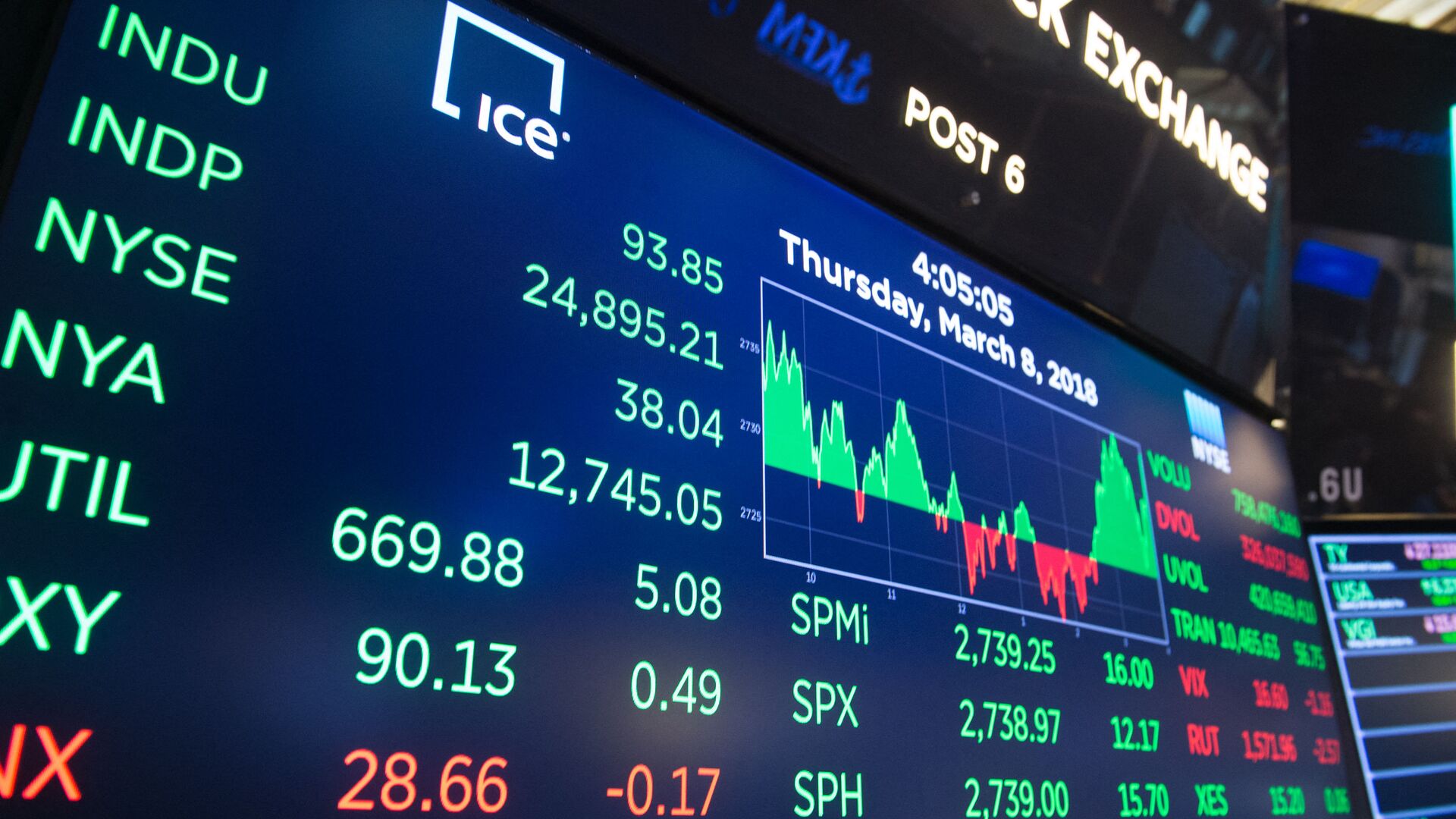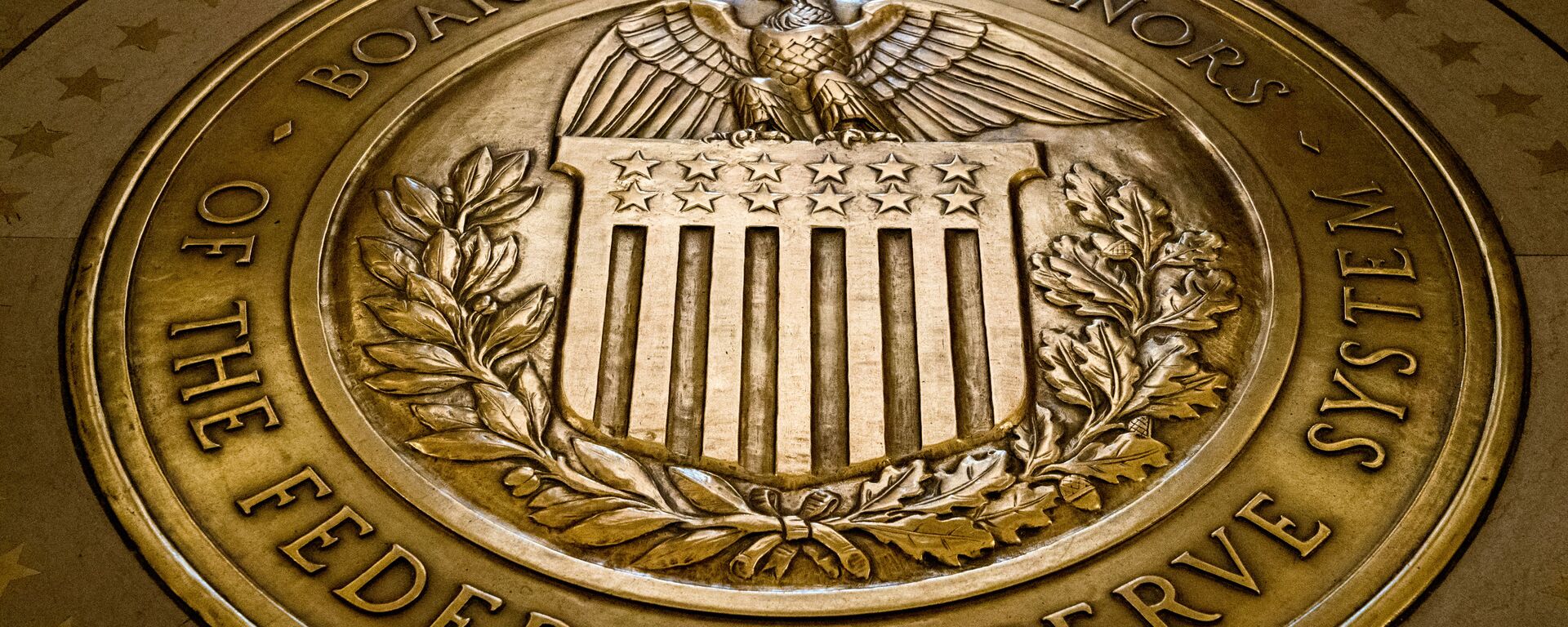https://sputnikglobe.com/20220505/dow-jones-plummets-over-1000-points-nasdaq-plunges-4-as-us-stock-sell-off-intensifies-1095292698.html
Dow Jones Plummets Over 1,000 Points, Nasdaq Plunges 4% as US Stock Sell Off Intensifies
Dow Jones Plummets Over 1,000 Points, Nasdaq Plunges 4% as US Stock Sell Off Intensifies
Sputnik International
The American stock market experienced a major surge following the Federal Reserve's decision to raise the interest rate to 1% in an attempt to overcome the... 05.05.2022, Sputnik International
2022-05-05T16:09+0000
2022-05-05T16:09+0000
2022-05-05T16:46+0000
us
stock exchange
dow jones
nasdaq
https://cdn1.img.sputnikglobe.com/img/07e5/03/0a/1082310177_0:0:3000:1688_1920x0_80_0_0_cc61358957045abe4e1ecc0ea57a7e51.jpg
The US stock index plummeted upon opening, with Nasdaq Composite losing 4.77% and Dow Jones dropping by a little over 3% as of 12:15 EDT (16:15 GMT). The S&P index which tracks the market performance of the 500 largest companies, also lost 3.55% since opening.The sharp decline in US markets contrasts with Europe, with Germany reporting only a mild decline and the FTSE 100 index growing on 5 May.The US share selloff comes hot on the heels of a major price rally experienced on 4 May, following the Federal Reserve's move to increase the interest rate by 0.5% up to 1%. Fed Chair Jerome Powell explained that the move looked to address the continuing and record-high inflation in the country.However, today's bearish movement reverted the 2.69% growth that the Dow Jones registered the day before. Likewise goes for the 3.12% increase to the Nasdaq Composite, which measures the performance of the US tech companies, and the previous 2.89% rally of the S&P 500.The Fed's move to increase interest rates is set to slow the economy down and hence force a decrease in inflation, already sparking fears of "stagflation." The latter is an anomalous state where despite increasing prices, the economy doesn't show any considerable growth.Some financial experts suggested that the bullish trend changed for a bearish one after investors realised that the Fed will not be making rapid increases to interest rate to quickly quell inflation, possibly keeping the problem out of the Reserve's control. Powell stated that the Fed will not be making dramatic three-quarter-point hikes in the future, and that it expected 0.25-0.5% increases to suffice.
https://sputnikglobe.com/20220504/us-federal-reserve-increases-interest-rates-by-05-in-biggest-hike-of-21st-century-1095268635.html
Sputnik International
feedback@sputniknews.com
+74956456601
MIA „Rossiya Segodnya“
2022
Tim Korso
https://cdn1.img.sputnikglobe.com/img/07e6/03/0d/1093831826_0:0:216:216_100x100_80_0_0_e3f43a960af0c6c99f7eb8ccbf5f812c.jpg
Tim Korso
https://cdn1.img.sputnikglobe.com/img/07e6/03/0d/1093831826_0:0:216:216_100x100_80_0_0_e3f43a960af0c6c99f7eb8ccbf5f812c.jpg
News
en_EN
Sputnik International
feedback@sputniknews.com
+74956456601
MIA „Rossiya Segodnya“
Sputnik International
feedback@sputniknews.com
+74956456601
MIA „Rossiya Segodnya“
Tim Korso
https://cdn1.img.sputnikglobe.com/img/07e6/03/0d/1093831826_0:0:216:216_100x100_80_0_0_e3f43a960af0c6c99f7eb8ccbf5f812c.jpg
us, stock exchange, dow jones, nasdaq
us, stock exchange, dow jones, nasdaq
Dow Jones Plummets Over 1,000 Points, Nasdaq Plunges 4% as US Stock Sell Off Intensifies
16:09 GMT 05.05.2022 (Updated: 16:46 GMT 05.05.2022) The American stock market experienced a major surge following the Federal Reserve's decision to raise the interest rate to 1% in an attempt to overcome the decades-high levels of inflation that is hitting fuel and consumer products hard.
The US stock index plummeted upon opening, with Nasdaq Composite losing 4.77% and Dow Jones dropping by a little over 3% as of 12:15 EDT (16:15 GMT). The S&P index which tracks the market performance of the 500 largest companies, also lost 3.55% since opening.
The sharp decline in US markets contrasts with Europe, with Germany reporting only a mild decline and the FTSE 100 index growing on 5 May.
The US share selloff comes hot on the heels of a
major price rally experienced on 4 May, following the Federal Reserve's move to increase the interest rate by 0.5% up to 1%. Fed Chair Jerome Powell explained that the move looked to address the continuing and record-high inflation in the country.
However, today's bearish movement reverted the 2.69% growth that the Dow Jones registered the day before. Likewise goes for the 3.12% increase to the Nasdaq Composite, which measures the performance of the US tech companies, and the previous 2.89% rally of the S&P 500.
The Fed's move to increase interest rates is set to slow the economy down and hence force a decrease in inflation, already sparking fears of "stagflation." The latter is an anomalous state where despite increasing prices, the economy doesn't show any considerable growth.
Some financial experts suggested that the bullish trend changed for a bearish one after investors realised that the Fed will not be making rapid increases to interest rate to quickly quell inflation, possibly keeping the problem out of the Reserve's control. Powell stated that the Fed will not be making dramatic three-quarter-point hikes in the future, and that it expected 0.25-0.5% increases to suffice.



